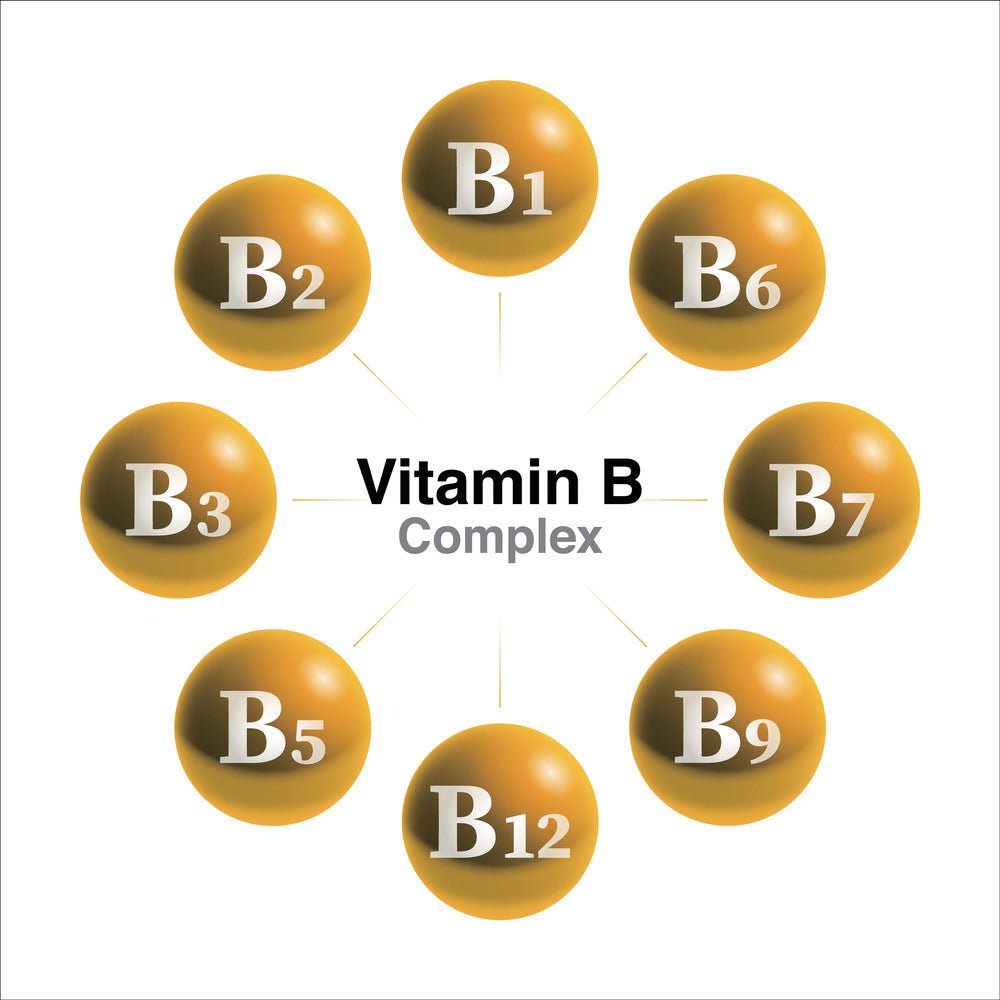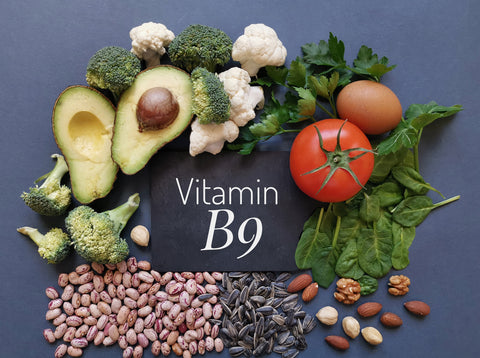Your cart is empty
Free shipping on all US orders


Free shipping on all orders

The B family of vitamins is amongst the most abundant in nature. Occurring in a wide variety of both animal and plant-based foods, they are responsible for so many functions that we could go on for days about their merits.
And yet, even though they are so naturally abundant, many people still find themselves on the receiving end of deficiencies. Not necessarily the entire spectrum of them, but specific members of the family.
If you're an athlete, you're at an even greater risk of developing a deficiency. This makes it even more important to ensure that you're getting the whole enchilada.
Let's address them individually so that you can see why each one is so important, and how you can make sure that you're getting enough in your diet.
You've probably heard the basic explanation that the B-vitamins help with metabolism, and that's it. But for the curious mind, this is far from satisfactory. After all, what does that even mean?

In order to understand how thiamine helps with metabolism, we must first understand what metabolism actually is.
Metabolism is defined as the sum of all chemical processes that occur within an organism in order to maintain life.
You can think of it as the spark of life that keeps everything going.
Thiamine is an essential component in the metabolism of carbohydrates, fats, and proteins. It helps to convert these macronutrients into energy that can be used by the cells.
It's also involved in the production of ATP, which is the main source of energy for the cells.
Requirements for B1 intake increase based on total calories consumed daily, as well as exercise status- with athletes generally requiring more since they're constantly depleting their stores.
The Recommended Dietary Allowance (RDA) is currently set at 1.2-1.5mg/day for adults, with athletes requiring closer to 2mg/day.
But back to the metabolism side of things- if you are a weight training athlete, B1 can help you make more muscle and strength gains by enhancing ATP production.
It does this by allowing a byproduct of anaerobic glucose metabolism known as pyruvate, to convert into acetyl co-enzyme A and be re-introduced into the Krebs cycle for the production of new ATP.
B1 deficiency is most common in dieting athletes, but there is reassurance in supplementing as excess is simply excreted in the urine and is non-toxic to the body.
So there's a quick run-down on thiamine and its importance to athletes. But the show doesn't stop there- each of the B-vitamins is important in its own right, so stay tuned for more!
B2 plays an important part in the formation of metabolic co-factors, eventually supporting optimal ATP synthesis. The usual RDA for B2 is 1.3-1.7mg/day for adults, but athletes may need as much as 2.5-3mg/day due to increased loss via sweat.

B2 is also an important antioxidant and can help to protect cells from damage caused by free radicals- those pesky little molecules that cause all sorts of problems in the body.
This is especially important for athletes, as they are constantly putting their bodies under stress and free radical production is increased as a result.
In fact, it is so good as an anti-oxidant that given in the post-workout window, it can help to reduce muscle soreness by reducing the amount of oxidative stress that occurs. It is vitally important to the health of the brain and nerves as well.
It's also been shown to improve recovery from interval training and can help to increase power output. Powerlifting and sports with a high risk of CNS desensitization and fatigue can benefit handsomely from additional supplementation with B2.
Athletes typically require about 30% more than baseline recommendations, and fortunately, this vitamin isn't often found deficient.
Niacin is a multi-purpose nutrient and is important for a variety of different biochemical reactions in the body. It is also necessary for the production of specialized metabolic co-factors, but of particular note, can play a significant role in the repair of defects or damage to DNA.

Typical RDA for niacin stands at about 15mg, but consumption of dosages up to 500mg is common when dealing with deficiency or for managing high cholesterol levels.
Be wary, however, as these high doses also tend to impair the amount of fat that is used for energy production.
Vit B5 is extremely common, being found in many foods we consume naturally or even fortified in others. The availability of this vitamin is considered the bottleneck that determines the amount of co-enzyme A that can be produced, which in turn is a major factor in how much energy we can produce from fats.
This is important for athletes, as, during endurance exercise, fats are the primary source of fuel used by the body to maintain activity. It also plays a part in the production of the protein heme- the protein in blood cells that is necessary for its oxygen-carrying potential.
Luckily, people- athletes included, are rarely deficient in this vitamin.
Pyridoxine or Vit B6 is a water-soluble vitamin that exists in three primary forms: pyridoxal, pyridoxamine, and pyridoxine.
It is important for a variety of reactions in the body, including amino acid metabolism, glycogen breakdown, and most importantly- red blood cell production. In fact, it can be argued that for the body to readily access its glycogen stores, sufficient amounts of this vitamin must be present.
While the RDA is only 1.3-1.7mg/day, athletes may need as much as 2-5mg/day due to increased loss via sweat.

This is especially relevant to athletes, as red blood cells play a vital role in transporting oxygen to working muscles. According to anecdotal reports, B6 might have performance-enhancing effects on the hormone erythropoietin, which increases the synthesis of red blood cells.
In turn, this can dramatically improve performance, especially in endurance-type exercise. However, the effects are not nearly as pronounced as would be obtained from the hormone. For this purpose, you may need to supplement with up to 100mg daily.
Pyridoxine is typically found in meat, poultry, and fish- making it readily available for most people. The RDA for adults is 1.3-1.7mg/day, but going higher than this can have a positive effect on performance.
Biotin is best known for its ability to promote the health and beauty of "hair, skin, and nails", but in reality, it also serves as an intermediate co-factor to many enzymes that impact metabolism, especially the storage of glucose as glycogen.
For this reason, it is actually considered more anabolic than other B vitamins, even though the magnitude of the effect is relatively small.
The good news is that biotin is found in many common foods, and as such, deficiency is rare. The RDA for biotin stands at 30mcg/day, but athletes may require up to 100mcg/day due to increased demand (supplementation with up to 10000mcg/ day is also fairly common).
Folate is most well known as a prenatal type vitamin, one that prevents neural tube defects in the unborn child, but has wide-ranging benefits on DNA synthesis. Most people don't technically develop a deficiency in this vitamin, but quite a few receive insufficient amounts.

Folate is especially important in red blood cell production, and a deficiency will result in anemia. For athletes, this can be extremely detrimental as it will decrease the oxygen-carrying capacity of working muscles.
The RDA for folate is 400mcg/day, but athletes may require up to 800mcg/day due to the increased demand.
Folate is found in many common foods, but the bioavailability can be low. For this reason, it is often recommended to supplement with folic acid- the synthetic form of the vitamin.
Cobalamin or Vit B12 is a water-soluble vitamin that serves as a co-enzyme to many reactions in the body, most notably DNA synthesis and red blood cell production.
It is the most popular of the B vitamins and is also the most likely to be deficient in your diet. Reasons may include the absence of animal-based foods- frequently occurring in vegans or vegetarians, or genetic conditions that limit dietary absorption.
The RDA for cobalamin is 2.4mcg/day, but athletes may require up to 10mcg/day due to increased demand.
While many people turn to supplementation, this isn't always necessary as the vitamin is found in a variety of animal-based foods such as meat, poultry, and fish.
No, it's not. That is very good news, but there is a bit of bad news. Insufficiency is fairly prevalent, occurring in approximately 25% of athletes. This is especially true of Vitamins B6, B12, and folic acid.
These are most important to athletic performance and health, so insufficiency can have a significant impact on both. Since a wide range of B vitamins are found naturally in a slew of foods, it's uncommon that you will show a significant deficiency, unless you find yourself in a special dietary class (such as vegans needing supplemental B12).
It means reduced performance and increased risk of injury. A lack of any one of the B vitamins can lead to a decrease in energy production, which leads to less power and endurance during exercise.
In addition, a B12 deficiency can cause anemia- a condition where red blood cells are unable to carry oxygen as efficiently. This is extremely detrimental for athletes, as it will decrease work capacity and stamina.
Athletes who may be at risk of insufficiency include vegetarians or vegans, as well as those following a strict diet or those who have trouble absorbing nutrients from food (due to celiac disease or other conditions).
The best way to ensure you're getting enough of any vitamin is through a varied and nutritious diet. This is especially true of the B vitamins, as they are found in a wide variety of foods.
That said, some athletes may still need to supplement, especially if they are following a restrictive diet or have trouble absorbing nutrients. The best way to know if you're deficient is to get your blood levels checked by a doctor or nutritionist.
If you are deficient, they will likely recommend supplementation in the form of pills or injections. We recommend Fortify and Field Of Greens, as they are high-quality and complete products that will help you reach your daily recommended intake of vitamins and minerals.
Vitamin B is essential for athletes, as it plays a vital role in energy production and red blood cell function. Insufficiency can lead to decreased performance and stamina, as well as anemia.
To ensure you're getting enough, eat a varied and nutritious diet that includes a variety of animal and plant-based foods. Some athletes may also need to supplement, especially if they are following a restrictive diet or performing endurance-type activity.
If you are diagnosed with an insufficiency- don't panic. It is easily remediable in 99% of cases with improved diet or supplementation.